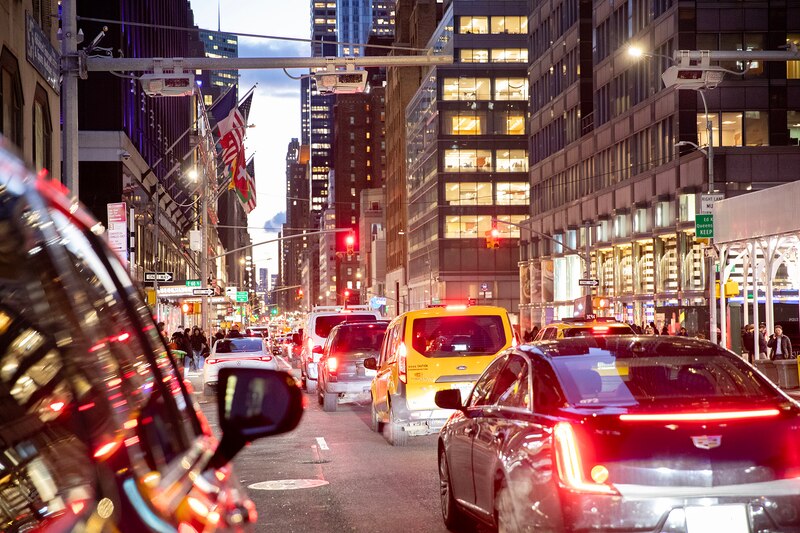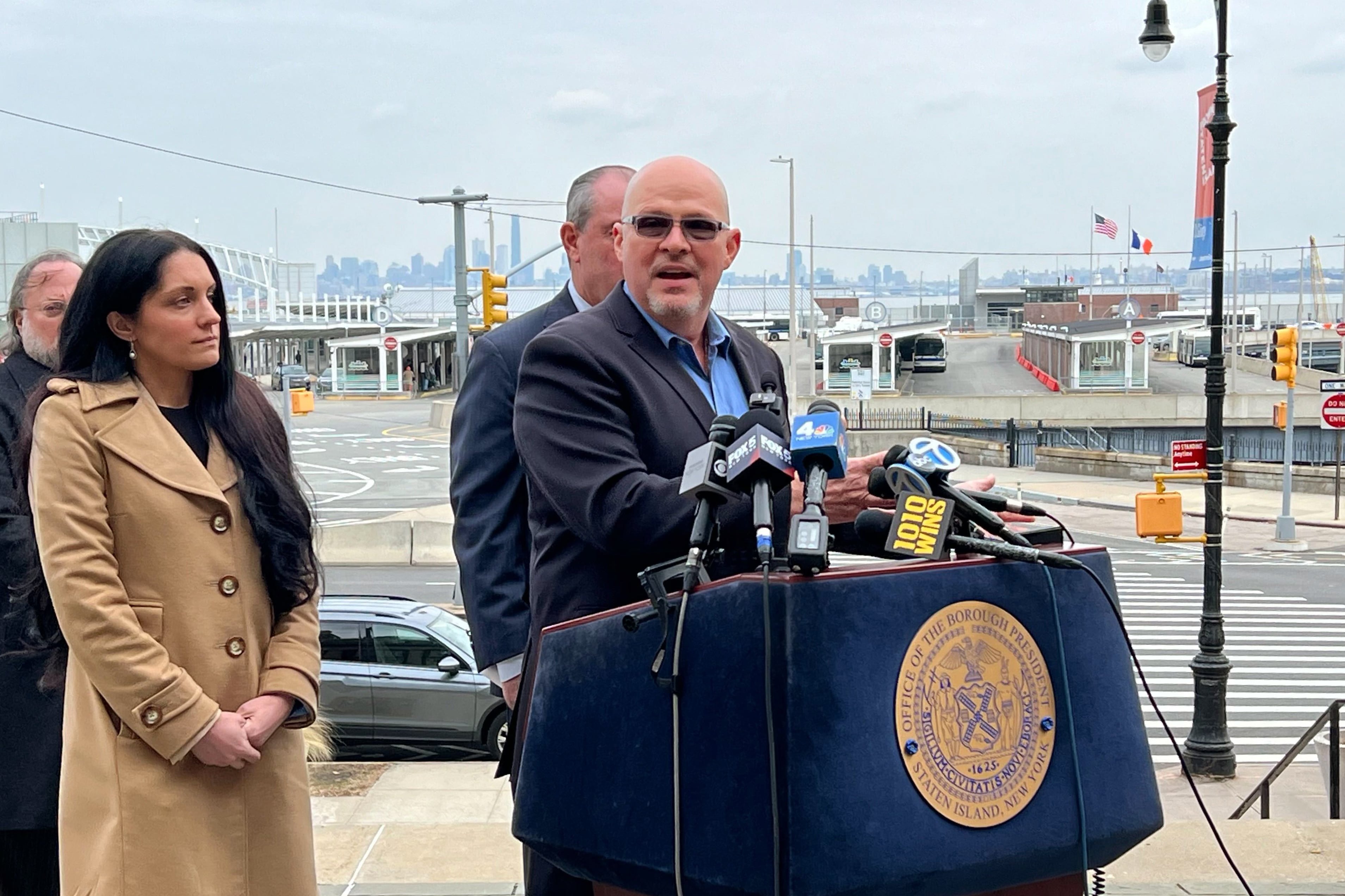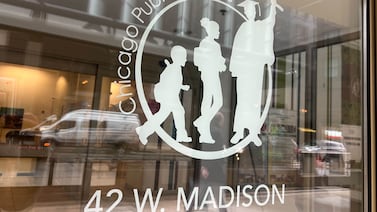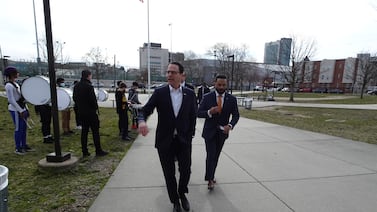Sign up for Chalkbeat New York’s free daily newsletter to keep up with NYC’s public schools.
New York City’s teachers union is trying to halt this spring’s planned implementation of congestion pricing, joining a lawsuit on Thursday with the Staten Island borough president.
The lawsuit claims that the congestion pricing plan — which will toll drivers who enter a swath of Manhattan to help finance public transit improvements — was created in a “rushed and hurried process that violated the comprehensive review requirements that a federal agency must take under federal law.” Seven teachers, who are plaintiffs in the suit, alleged that the “regressive and discriminatory pricing” of the tolls violates their constitutional rights.
Transit advocates blasted the lawsuit, arguing that congestion pricing will improve commutes for school staff and families.
The Metropolitan Transportation Authority’s board voted to approve tolls last month for vehicles entering Manhattan south of 60th Street, including a $15 daily fee on cars between 5 a.m. to 9 p.m. on weekdays and from 9 a.m. to 9 p.m. on weekends. (Under the proposed tolling structure, low-income drivers will receive a discount on the congestion charges.)
After a 60-day comment period, including public hearings from Feb. 29 through March 4, the MTA’s board will take a final vote.
“Teachers, firefighters, police officers, EMS workers, sanitation workers and other public sector workers who are essential to the fabric of New York City would be forced to shoulder the burden of the MTA’s latest fundraising gambit,” the lawsuit claims.
The suit, filed in the U.S. Court for the Eastern District of New York, also claims that parts of Staten Island as well as the Bronx will see more pollution as some drivers divert around the congestion zone.
For years, New York City transit and environmental advocates along with elected officials have pushed for a congestion pricing program to reduce gridlock and pollution as well as raise revenue for the MTA. The program is required to raise enough money to finance at least $15 billion in capital projects for public transit.
The program would be the first of its kind in the United States, though other countries have successfully deployed the model.
The environmental review process involved four years of consultation with government agencies, public outreach, and impacts on traffic and air quality detailed in “hundreds of pages of painstaking detail,” said MTA spokesperson John McCarthy.
“If we really want to combat ever-worsening clogged streets we must adequately fund a public transit system that will bring safer and less congested streets, cleaner air, and better transit for the vast majority of students and teachers who take mass transit to school,” McCarthy said in a statement.
Staten Island teachers share concerns about the plan
The plan has long had its share of opponents, including some teachers who drive to work or are based at campuses where locals worry the traffic could increase. Troy McGhie, a plaintiff in the suit and a ninth grade special education teacher at Staten Island’s Curtis High School, worried that increased traffic to the Staten Island ferry will bring more vehicles and air pollution around his school.
Maria Mazier, a Staten Island resident and speech pathologist who drives to the Children’s Workshop School in the East Village, said commuting on public transit would take nearly two hours each day. Because of the $15 fee, she is planning to transfer to a school in Brooklyn, according to the lawsuit. Plaintiff Hannah Choi, another Staten Island resident and third grade teacher at Chelsea’s P.S. 33, said public transit would take her nearly three hours, and she, too, is looking to transfer to a school in Brooklyn or her home borough. About 11,515 of the teachers union’s members live in Staten Island, according to the lawsuit. That represents about 6% of the union’s membership.

Still, advocates contend that congestion pricing would benefit commuters on Staten Island. The fees would help reduce travel times for those who continue to drive and speed up express buses that run from Staten Island into Manhattan. Plus, the MTA is planning to use some of the revenue from the tolling program to address pollution caused by diverted traffic in other communities.
“The teachers that are die-hards that stick to driving will have shorter commutes,” said Danny Pearlstein, the policy and communications director for Riders Alliance, an advocacy group that supports congestion pricing. “This is a program that will bring in billions of dollars to fix a subway that is used by hundreds of thousands more riders when school is in session.”
Teachers union joins fray late in the game
Transit advocates also pointed out that the teachers union, a powerful political player in Albany, had not previously weighed in on the proposal — including when it was passed in the state’s 2019 budget. Union officials said they were waiting for details about how the plan would be implemented before taking a position.
Policies that make it easier for educators to drive to school have long been controversial. Former Mayor Michael Bloomberg reduced the number of parking permits issued to educators, a move that drew a legal challenge, while former Mayor Bill de Blasio reinstated tens of thousands of them.
The availability of free parking may give teachers an extra incentive to drive, though the majority of commuters who travel into Manhattan use public transportation. A 2022 study by the Community Service Society found those who commute to Manhattan by car are more likely to have higher incomes and the new tolls were likely to affect a tiny share of low-income residents.
A spokesperson for Mayor Eric Adams said he supports congestion pricing but has also pushed for some exemptions to the plan, including for taxis and school buses.
The union’s lawsuit is the latest in a series of legal challenges against the plan: New Jersey’s Gov. Phil Murphy sued the federal government in the summer over its approval of the plan, and the mayor of Fort Lee, New Jersey, filed a lawsuit in November, because of concerns about increased traffic near the George Washington Bridge.
Alex Zimmerman is a reporter for Chalkbeat New York, covering NYC public schools. Contact Alex at azimmerman@chalkbeat.org.
Amy Zimmer is the bureau chief for Chalkbeat New York. Contact Amy at azimmer@chalkbeat.org.







